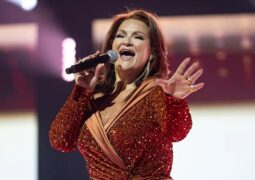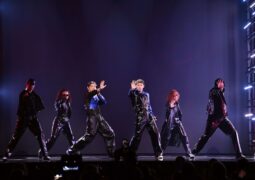The TV medium grows in the 70�s and Sweden now has two channels to choose from. Melodifestivalen stays on channel one for another 18 years. The left wingers are getting more power and influence in Sweden and in 1975 when the Eurovision Song Contest is held in Sweden for the very first time it is under attack with demonstrations and alternative festivals. But in the middle of all this a Swedish group get their big breakthrough and becomes one the biggest selling recording artists in history.
In 1970 Sweden started by protesting against the (four way tied) result in 1969 and decided not to take part. All Nordic countries stayed home, together with Austria and Portugal. In the Swedish newspapers there were short stories saying that the 1970 final was the night the very last Eurovision Song Contest was held. How very wrong they were.
In 1971 Sweden were back in business with 5 semifinals and 1 big final. Three artists had been chosen to take part, one male singer Tommy Körberg, one female singer Sylvia Vrethammar and one group Family Four. They had 5 songs to sing, one in each semifinal. This year Melodifestivalen was part of the popular tv-show "Hylands Hörna" The funny thing was that Family Four won all 5 semifinals and this meant that for the second time in history one artist sang all the songs in the final of Melodifestivalen. The winning song was called Vita vidder (Winter landscape). The song finished 6th in Dublin.
In 1972 Melodifestivalen was back but this time no semifinals were held and it wasn't part of any other TV show. The format was the same as in 1967: 10 artists had been selected to take part. A 19 year old Tomas Ledin makes his debut as well as opera singer Kerstin Dellert.A few days before the deadline for submitting songs, SR had to make a decision on a rule that all composers need to be Swedish citizen. The problem was Cornelius Wreesvijk, who was one of the selected artists, held Dutch citizenship: he had not been satisfied with the songs he had been offered and wanted to write his own song. The rule was quickly changed and Cornelius could compose his own entry. Family Four won again but this time they changed from winter to summer and named their song Härliga Sommardag (Lovely summerday). This time Family Four had to settle for 13th place in Edinburgh.
1973 was the year when the composers were at the centre of Melodifestivalen and SR invited a mix of pop and jazz composers. The youngest participant was Ted Gärdestad, only 17 years old, who sang his and his brother's composition Oh vilken härlig dag (Oh what a lovely day). The winner was the group Malta with the song Sommaren som aldrig sager nej (The summer that never says no). The lyrics of this song were heavily debated in Sweden due to their slightly erotic nature. But that was nothing compared to the enormous attack from the people on the jury that had put Abba in third place with their song Ring Ring The winners went to Luxembourg with their name changed from Malta to The Novas, the song was sung in English and finished 5th.
After the storm last year SR wanted everything perfect in 1974. The same system as last year was used, except the single expert jury was replaced by ordinary people in juries around the country. 10 songs competed and Abba were big favourites with their song Waterloo. They won big and went to Brighton and finally Sweden got their long awaited victory at the Eurovision Song Contest! One funny thing was that Lasse Berghagen got stuck with his microphone at the beginning of his song and therefore made a quick comment before ha started to sing "I'm stuck with the microphone but that doesn't matter" He finished second.
For the first time in history Melodifestivalen was held outside Stockholm; the honour of hosting the contest had gone to Gothenburg. The place is studio 1 at the TV-centre in Gothenburg. Only invited composers were allowed to submit there songs this year. 10 songs competed in one of the closest Melodifestivalen ever. All the songs have become classics, and the 1975 heat is considered to be one of the best ever. Karin Falck introduced the show and got some practice before she would later that same year introduce the Eurovision Song Contest from Stockholm. The winner was Lasse Berghagen with the song Jennie Jennie and got the honour of defending the gold from 1974. He finished 8th at the Eurovision Song Contest.
Sweden stayed home again in 1976 due to massive left-wing criticism of the Contest and big demonstrations that were held in 1975. But also a fear of winning again, since that was the last thing SR wanted. Hosting the 1975 edition had created big holes in the budget and the fear was that another victory would ruin the company. The official statement was that Sweden should take part again when the other countries decided to send songs of a higher standard.
That raise of standard was quick because in 1977 we were back in business. Anybody could submit songs and SR received around 1100 songs. Ten were chosen to compete. Three of those were composed by Tomas Ledin. One he sang himself, one he left to Eva Rydberg and the third was given to Mats Rådberg. The jury was heavily criticised for not selecting any songs with hit potential. This is one of weakest line up of songs in Melodifestivalen ever. The winning song was Beatles, performed by the group Forbes. They went to London, received only 2 points from Germany and finished last.
After the fiasco last year SR decided in 1978 to only invite professional composers to submit songs. 58 songs were submitted , 10 of those were selected. The voting was a reprise of 1969 when two songs finished at the top. So Björn Skifs with Det blir alltid värre framåt natten and Wizex with Miss Decibel had to sing again, and after the re-vote Björn Skifs was deemed the winner. He went to Paris where he forgot the lyrics but that something that only the Swedes noticed. He finished 14th. Both songs were very successful in the Swedish charts.
1979 became the year of the stars. With Py Bäckman, Ted Gärdestad, Tomas Ledin, Eva Dahlgren and Magnus Uggla (who is one the wildcards in 2007) all of whom would become big stars in Sweden and are still today some of Sweden's most popular artists. Ted Gärdestad won with his song Satelitt. He set offf to Jerusalem to secure the second Swedish victory but ends up 17th. After Abba it looked like we would never win again, or even be in the top 5, but in a few years Sweden would rise to the occasion and become on of the most successful countries in this competition.




